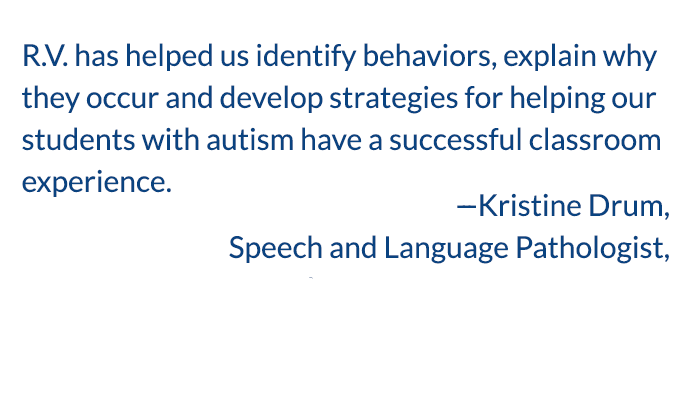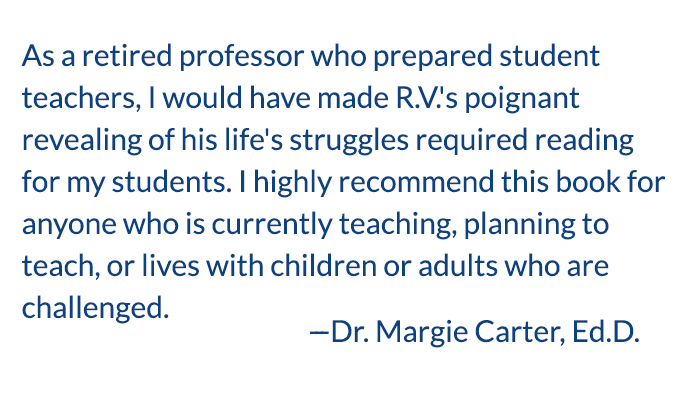Hello ~ Glad you stopped by.
For me, writing is a way to advocate for people who are disabled. I am on a lifelong quest for ways to overcome misperceptions about disabled individuals. To let everyone know, we CAN do anything. With Marlene by my side, we give greater insights when speaking publicly and advocating.
— R.V. Kuser
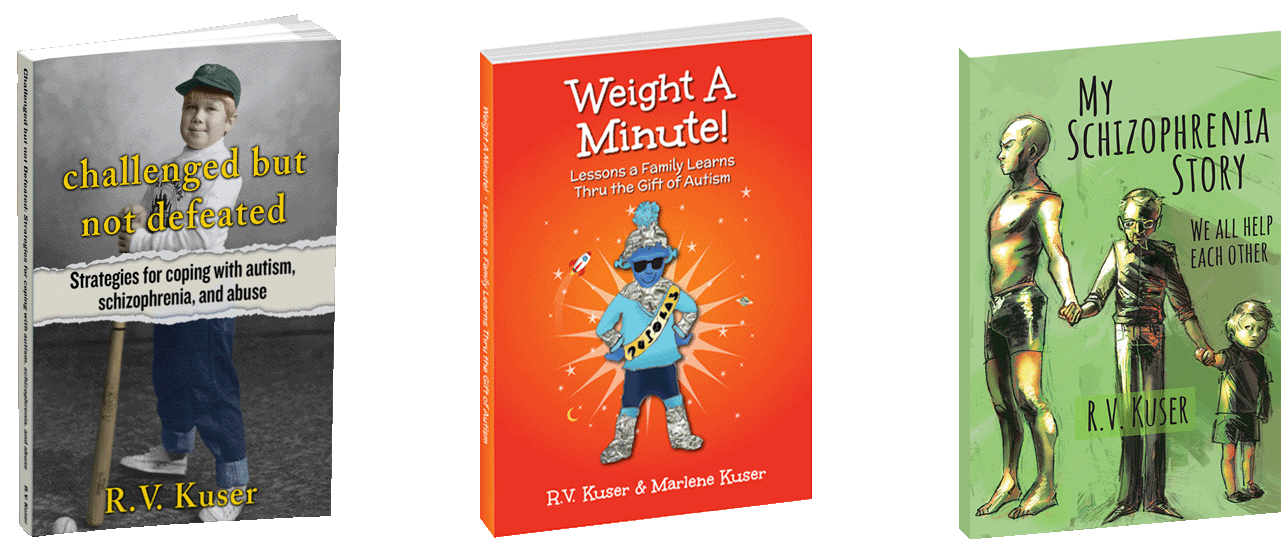
R.V. Kuser Wins Leadership Achievement Award
The North Carolina Leadership Achievement Award, which recognizes an outstanding North Carolina self-advocate whose work has improved the quality of life for people with I/DD, was awarded to R.V. Kuser of Winston-Salem. Having worked as a developmental specialist and autism coordinator, Kuser has traveled the state speaking about autism and schizophrenia. He is the author of three books: Challenged But Not Defeated—Strategies for Coping with Autism and Schizophrenia, and Weight A Minute! Lessons a Family Learns Thru the Gift of Autism, and My Schizophrenia Story—We all help each other.
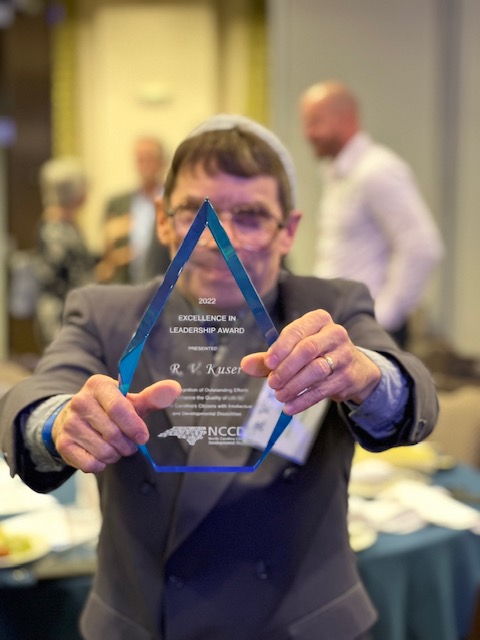
Did you know...
- 1 in 4 adults in the U.S. live with some type of disability.
- 85% of people living with autism are unemployed.
We are proud to announce that we are Southeast ADA (Americans with Disabilities Act) Trainer Network Members. Our mission is to advocate and educate everyone, individuals and organizations, about how the ADA can help them.
Our purpose is to help elevate individuals with disabilities and to help organizations recognize that people living with a disability can enhance the workforce in many ways. 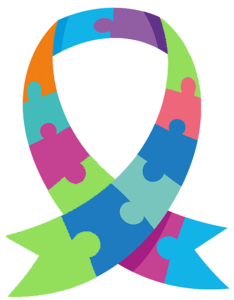 Before the passing of the ADA, the disabled community was underutilized in the workforce and had to compromise their quality of life.
Before the passing of the ADA, the disabled community was underutilized in the workforce and had to compromise their quality of life.
Why do we care so much?
The passing of the ADA is personal for me. The ADA was passed in 1990. Growing up I did not have the opportunities the ADA provides. I graduated high school unable to read and write at the appropriate level. Fortunately, I received help and now I am an author of three books.
It is essential for us to provide information and guidance.
My Journey
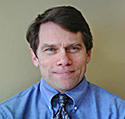 I feel connected and very rewarded when I’m working with individuals who have a learning disability ~ watch Achieve Anything, a video of my “Aha” moment (see below). I have worked in education for 30-plus years. All my experience has been educating individuals with some form of learning disability, spanning the gamut from children to adults. When I am teaching I allow myself to be an educational conduit to help individuals find their own personal solutions to learning more effectively, and in turn they can use their new tools throughout their entire lives. I feel rewarded because I know I’m an integral part of the process but also because I have a learning disability; I live with autism, to be exact. Who else but a fellow perceptually impaired individual could understand thoroughly what another individual with a learning disability is going through? Throughout my entire life I have found ways to compensate for my learning difficulties and enjoy teaching
I feel connected and very rewarded when I’m working with individuals who have a learning disability ~ watch Achieve Anything, a video of my “Aha” moment (see below). I have worked in education for 30-plus years. All my experience has been educating individuals with some form of learning disability, spanning the gamut from children to adults. When I am teaching I allow myself to be an educational conduit to help individuals find their own personal solutions to learning more effectively, and in turn they can use their new tools throughout their entire lives. I feel rewarded because I know I’m an integral part of the process but also because I have a learning disability; I live with autism, to be exact. Who else but a fellow perceptually impaired individual could understand thoroughly what another individual with a learning disability is going through? Throughout my entire life I have found ways to compensate for my learning difficulties and enjoy teaching
this to others. My wife is also an integral part of my life. Marlene has helped me to discover my strengths, to believe in myself, to have a greater insight into autism and schizophrenia, and she accepts me unconditionally. Our relationship has evolved into a mutually helpful partnership.
My Employment History
I have consulted for The Special Children’s School in Winston Salem, North Carolina and also numerous schools in Guilford County, North Carolina. Previously, I was at the Freehold Borough School System in New Jersey. Through out my ten years there, I taught from preschool to 12th grade level. Another previous job was with the East Brunswick Adult Education Program for Persons with a Mental Disability. It is nationally recognized as one of the premier programs for adults who have a mental disabiiity. I was extremely privileged and honored to have been a part of this program.
What is Autism?
Autism is a pervasive developmental disorder characterized by impaired communication, extreme self-absorption, and detachment from reality. Imagine a world where you did not see, hear, smell, feel and taste the way everyone else does. Imagine lights and sounds that besiege your senses. Autism never sleeps, autism never takes a rest, it is constant and unwavering. This can be terrifying, and often what individuals with autism face almost every minute. Individuals with autism have difficulty. Autistic individuals have difficulty speaking, walking, and doing things that capable people take for granted.
Did You Know. . .?
- 1 in 36 children is diagnosed with autism.
- More children will be diagnosed with autism this year than with AIDS, diabetes & cancer combined.
- Boys are four times more likely than girls to have autism.
- The risk of autism is more likely in males and not associated with any one race.

Every individual has their own strengths. We help you to discover your hidden potential ~ “to understand your gift!”
 Identifying Signs Of Autism*
Identifying Signs Of Autism*
Signs of autism can be detected early in babies, resulting in early screening and diagnosing. Poor communication skills are the benchmark of these developmental disorders, but it is difficult to gauge very young children’s abilities.
Early signs can include:
- not responding to one’s name
- an absence of babbling or joyful expressions
- trouble interacting, playing with, or relating to others
- avoiding eye contact; not looking at people
- not pointing to objects to call attention to them
- unusual movements, such as hand flapping, spinning, or tapping
- not using or understanding language
- delays in developmental milestones or loss of milestones already achieved
- playing with the same toy in a way that seems odd or repetitive
- not exploring surroundings with curiosity or interest
- hypersensitivity of the senses, sight, sound, touch, taste and smell
* Is it really autism or do the symptoms just look like autism? There are many possibilities some includes, alterations in nutrients and infections, just to name a few. For more information about autism, visit kidshealth.org and the National Institutes of Health.
What is Schizophrenia?
Schizophrenia is a mental disorder characterized by abnormal social behavior and failure to understand what is real. Common symptoms include false beliefs, unclear or confused thinking, hearing voices, reduced social engagement and emotional expression, and a lack of motivation. People living with schizophrenia often have additional mental health problems, such as anxiety disorders, major depressive illness, or substance use disorder. Symptoms typically come on gradually, begin in young adulthood, and last a long time. More from Wikipedia, the free encyclopedia:
There is help: “The Recovery Model”
Recovery means different things to different people. For me, it is a process of enabling my body and my mind to be in sync with each other. In turn, this helps me to achieve a greater clarity. The Recovery Support Strategic Initiative, SAMHSA, has outlined four major dimensions that support a life in recovery:
- Health. Overcoming or managing one’s disease(s) or symptoms—for example, abstaining from the use of alcohol or drugs if one has trouble with addiction—and for everyone in recovery, making informed, healthy choices that support physical and emotional well being.
- Home. A stable and safe place to live.
- Purpose. Meaningful daily activities, such as a job, school, volunteerism, family care taking or creative endeavors, and the independence, income and resources to participate in society.
- Community. Relationships and social networks that provide support, friendship, love and hope.
See more at: Science meets the human experience
Our Videos
Autism In Love, a short documentary featured at the Riverrun Film Festival, Winston-Salem, NC April 2013
Affiliations
R.V. is on the Board of Directors for Solutions for Independence, Winston Salem, NC.
R.V. and Marlene are on the Board of Directors for Greentree Peer Center, Winston Salem, NC.
Press
Q. and A. with author R.V. Kuser, from artview in the Winston-Salem Journal (click above to download PDF)
Article from Forsyth Family Magazine (p. 62) (click to view article)
How can we help you?
We are available for consultations, tutoring, lectures and workshops ~ your first consultation is free! Topics include:
- History of Disability
- Inclusion and Diversity
- Autism in Love
- Understanding and Embracing Autism
- We Are Best Friends – I’ll Stand By You
- Life Skills
- Recovery Model Approach
- Living With Autism: Insider and Outsider Perspectives
- “Hearing” Light Waves — “Seeing” Sound Waves
Do you need a speaker? Customized lectures or workshops are available upon request. Please contact us for more information.

